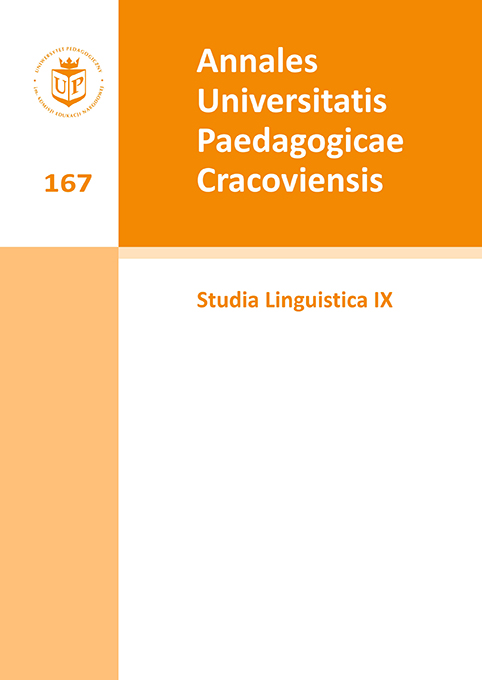Kompetencja składniowa jako przedmiot badań neurolingwistycznych – wprowadzenie do neurosyntaktyki
Main Article Content
Abstract
The article is a voice in favour of creating a new branch within neurolinguistics which can be described as neurosyntactics. The methodological and terminological aspects of this concept are supported by several factors such as the history of neurology, the linguistic arguments, the development of neuropsychology and neurologopedics (especially apha- siology), and the achievements of neurolinguistics as one of the applied sciences. Additionally, creating space for a new and narrow neurolinguistic speciality within the scientific discourse could produce - apart from serving the research purposes - new practical information for the medical, therapeutic, and educational fields.
Downloads
Article Details

This work is licensed under a Creative Commons Attribution-NonCommercial-NoDerivatives 4.0 International License.
Author, submitting a text to the editorial board of the journal “Annales Universitatis Paedagogicae Cracoviensis. Studia Linguistica", certifies that the content of the article has not been published so far and that the work does not violate in any way the copyright or related rights of other person, as well as other rights of third parties, and that no one's rights to the work (or any part thereof) have been missed. After signing the contract, the property rights to the published materials are transferred to the Scientific Publisher of the University of the National Education Commission, Krakow.
“Annales Universitatis Paedagogicae Cracoviensis. Studia Linguistica” is an open access journal, and all its content is made available free of charge to users and institutions under the Creative Commons CC-BY-NC-ND 4.0 license (attribution, non-commercial use, no derivative works). Under this license, the authors agree that their work may be lawfully reused for any purpose, except for commercial purposes, without the prior consent of the author or publisher. Everyone can read, download, copy, print, distribute and process these works, provided that the author's marking and the original publication place are correct. Published texts may not be used to create derivative works (e.g. to translate and publish in another language without the consent of the publisher). This is in line with the BOAI (Budapest Open Access Initiative) definition. "Studia Linguistica" does not charge for submitting or processing articles.
References
Brown R., 1980, Pierwsze zdania w mowie dziecka i szympansa, [w:] Badania nad rozwojem języka dziecka, red. G.W. Shugar, M. Smoczyńska, tłum. Z. Babska et al., Warszawa, s. 342–370.
Google Scholar
Chomsky N., 1982, Zagadnienia teorii składni, tłum. I. Jakubczak, Wrocław.
Google Scholar
Damasio A., 1999, Błąd Kartezjusza. Emocje, rozum i ludzki mózg, tłum. M. Karpiński, Poznań.
Google Scholar
Grabias S., 2012, Teoria zaburzeń mowy. Perspektywy badań, typologie zaburzeń, procedury postępowania logopedycznego, [w:] Logopedia. Teoria zaburzeń mowy, red. S. Grabias, M. Kurkowski, Lublin, s. 15–71.
Google Scholar
Grabowska A., 2011, Mózgowe mechanizmy komunikacji językowej z perspektywy metod neuroobrazowania, [w:] Język jako przedmiot badań psychologicznych. Psycholingwistyka ogólna i neurolingwistyka, red. I. Kurcz, H. Okuniewska, Warszawa, s. 308–347.
Google Scholar
Grochowski M., Karolak S., Topolińska Z., 1984, Gramatyka współczesnego języka polskiego. Składnia, red. S. Urbańczyk, Warszawa.
Google Scholar
Grodzinsky Y., 2000, The Neurology of Syntax. Language Use without Broca’s Area, „Behavioral and Brain Sciences”, t. 23, s. 1–71.
Google Scholar
Grucza F., 1983, Zagadnienia metalingwistyki. Lingwistyka – jej przedmiot, lingwistyka stosowana, Warszawa.
Google Scholar
Herzyk A., 2005, Wprowadzenie do neuropsychologii klinicznej, Warszawa.
Google Scholar
Hickok G., Zurif E., Canseco-Gonzales E., 1993, Structural Description of Agramatic Com- prehension, „Brain and Language”, t. 45, s. 371–395.
Google Scholar
Jodłowski S., 1976, Podstawy składni polskiej, Warszawa.
Google Scholar
Kaczmarek B.L.J., 1995, Mózg, język, zachowanie, Lublin.
Google Scholar
Kurcz I., Okuniewska H. (red.), 2011, Język jako przedmiot badań psychologicznych. Psycholingwistyka ogólna i neurolingwistyka, Warszawa.
Google Scholar
Łuria A.R., 1976a, Podstawy neuropsychologii, tłum. D. Kądzielawa, Warszawa.
Google Scholar
Łuria A.R., 1976b, Problemy neuropsychologii i neurolingwistyki, tłum. E. Madejski, Warszawa.
Google Scholar
Maruszewski Mariusz, 1966, Afazja. Zagadnienia teorii i terapii, Warszawa.
Google Scholar
Mazurkiewicz-Sokołowska J., 2006, Transformacje i strategie wiązania w lingwistycznych badaniach eksperymentalnych, Kraków.
Google Scholar
Mazurkiewicz-Sokołowska J., 2010, Lingwistyka mentalna w zarysie. O zdolności językowej w ujęciu integrującym, Kraków.
Google Scholar
Mecner P., 2005, Elementy gramatyki umysłu, Kraków.
Google Scholar
Mesulam M.M., 2009, Od doznania do poznania, [w:] Neuropsychologia. Współczesne kierunki badań, red. K. Jodzio, Warszawa, s. 233–318.
Google Scholar
Michalik M., 2011, Kompetencja składniowa w normie i w zaburzeniach. Ujęcie integrujące, Kraków.
Google Scholar
Michalik M., 2015, Transdyscyplinarność logopedii – między metodologiczną koniecznością a teoretyczną utopią (w druku).
Google Scholar
Panasiuk J., 2014, Neurobiologiczne podstawy mowy, [w:] Biomedyczne podstawy logopedii, red. S. Milewski, J. Kuczkowski, K. Kaczorowska-Bray, Gdańsk, s. 359–409.
Google Scholar
Pąchalska M., 2007, Neuropsychologia kliniczna. Urazy mózgu. Procesy poznawcze i emocjonalne, t. 1, Warszawa.
Google Scholar
Rittel T., 1994, Podstawy lingwistyki edukacyjnej. Nabywanie i kształcenie języka, Kraków.
Google Scholar
Sarota M., 2013, Dlaczego logopedzie potrzebna jest neurolingwistyka?, [w:] Synergia.
Google Scholar
Mowa, terapia, wychowanie, red. M. Michalik, A. Hetman, Jastrzębie-Zdrój – Kraków, s. 39–63.
Google Scholar
Spitzer M., 2007, Jak uczy się mózg?, Warszawa.
Google Scholar
Urbańczyk S. (red.), 1992, Encyklopedia języka polskiego, Wrocław – Warszawa – Kraków.
Google Scholar
Zyss T., 2013, Historia badań nad mózgową lateralizacją funkcji językowych, „Nowa Logopedia”, t. 4: Interakcyjne uwarunkowania rozwoju i zaburzeń mowy, red. M. Michalik, A. Siudak, H. Pawłowska-Jaroń, Kraków, s. 43–65.
Google Scholar
